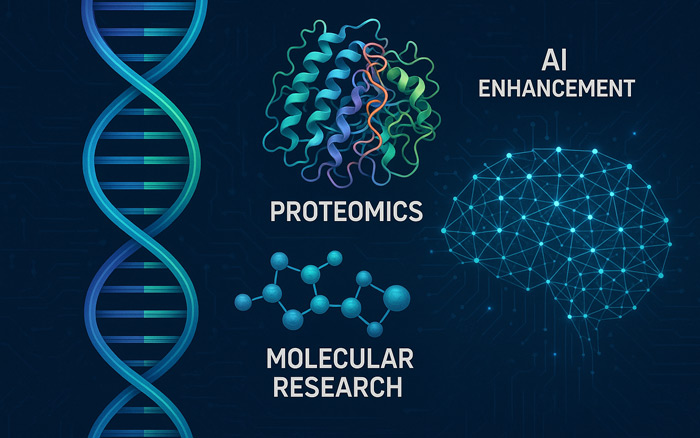How Generative AI Supports Genomics, Proteomics, and Molecular Research
The convergence of generative artificial intelligence with genomics, proteomics, and molecular research represents one of the most significant technological advances in modern biological sciences. As pharmaceutical researchers grapple with the overwhelming complexity of biological systems and the exponential growth of molecular data, AI emerges as an indispensable tool for extracting meaningful insights from vast datasets. This technological integration is revolutionizing how scientists approach fundamental questions in molecular biology, enabling discoveries that were previously beyond the reach of traditional analytical methods and opening new therapeutic possibilities across diverse disease areas.
The Data Revolution in Molecular Biology
Modern molecular research generates unprecedented volumes of complex, multi-dimensional data that challenge traditional analytical approaches. High-throughput genomic sequencing projects routinely produce terabytes of sequence data, while proteomics studies generate millions of mass spectrometry spectra requiring sophisticated computational analysis for meaningful interpretation. The integration of multi-omics approaches further compounds this complexity, creating datasets that span genomics, transcriptomics, proteomics, metabolomics, and epigenomics domains.
Traditional bioinformatics approaches, while valuable, often struggle with the scale, complexity, and heterogeneity of contemporary molecular datasets. Conventional statistical methods may miss subtle patterns that exist across different omics layers, while rule-based algorithms fail to capture the intricate relationships that characterize biological systems. The challenge becomes even more daunting when researchers attempt to integrate molecular data with clinical outcomes, environmental factors, and temporal dynamics.
AI-driven molecular biology addresses these limitations by employing sophisticated machine learning algorithms capable of identifying complex patterns across diverse data types. Unlike traditional analytical approaches that rely on predefined hypotheses and linear relationships, AI systems can discover non-obvious associations, predict molecular interactions, and generate novel insights that guide experimental research directions.
The technology excels at handling missing data, experimental noise, and batch effects that commonly affect large-scale molecular studies. Advanced algorithms can impute missing values, normalize data across different experimental platforms, and identify systematic biases that might confound traditional analytical approaches.
Transforming Genomic Analysis and Interpretation
Genomics research has been fundamentally transformed by the application of generative AI technologies that can analyze vast genomic datasets, predict functional elements, and identify disease-associated variants with unprecedented accuracy. Modern AI systems can process whole-genome sequencing data, identify structural variants, and predict the functional impact of genetic modifications across diverse populations and disease contexts.
Variant interpretation represents a particularly challenging aspect of genomic research that benefits significantly from AI-driven approaches. Traditional methods for assessing variant pathogenicity rely on established databases and expert interpretation, processes that become increasingly difficult as the number of identified variants grows exponentially. AI systems can integrate multiple lines of evidence including evolutionary conservation, structural impact predictions, population frequency data, and functional assay results to provide comprehensive variant assessments.
The technology enables personalized genomic analysis that accounts for individual genetic backgrounds, population ancestry, and disease risk profiles. AI algorithms can identify rare disease-causing variants, predict pharmacogenomic responses, and recommend targeted therapeutic approaches based on individual genomic profiles.
Structural variation detection and analysis benefit from AI approaches that can identify complex rearrangements, copy number variations, and chromosomal abnormalities that may be missed by conventional analytical pipelines. These capabilities are particularly valuable for cancer genomics research where structural variations often drive disease progression and therapeutic resistance.
Advancing Proteomics Through Machine Learning
Proteomics research faces unique challenges related to protein complexity, dynamic range issues, and the lack of comprehensive protein databases that parallel the completeness of genomic references. Generative AI addresses these challenges by enabling more sophisticated protein identification, quantification, and functional analysis approaches that maximize information extraction from proteomics experiments.
Mass spectrometry data analysis benefits significantly from AI-driven approaches that can improve peptide identification, enhance quantification accuracy, and identify post-translational modifications with greater sensitivity and specificity. Machine learning algorithms can learn optimal fragmentation patterns, account for instrument-specific characteristics, and adapt to different experimental conditions to improve overall data quality.
Protein structure prediction represents one of the most spectacular successes of AI in molecular biology, with systems like AlphaFold revolutionizing structural biology by providing accurate three-dimensional structure predictions for millions of proteins. These structural insights enable better understanding of protein function, drug-target interactions, and evolutionary relationships across diverse protein families.
Protein-protein interaction prediction benefits from AI approaches that can integrate sequence information, structural data, and experimental evidence to identify functional interaction networks. These predicted interactions provide valuable insights into cellular processes and disease mechanisms while guiding experimental validation efforts.
The technology enables comprehensive analysis of proteomic datasets that integrate protein expression levels with post-translational modifications, subcellular localization, and functional annotations. This multi-dimensional analysis provides more complete pictures of protein function and regulation in health and disease contexts.
Integrating Multi-Omics Data for Systems Biology

One of the most powerful applications of AI-driven molecular biology lies in its ability to integrate diverse omics datasets to generate comprehensive understanding of biological systems. Traditional approaches typically analyze each omics layer separately, potentially missing important relationships that exist across different molecular levels.
Multi-omics integration requires sophisticated algorithms capable of handling different data types, scales, and experimental platforms while identifying meaningful relationships between genomic variants, gene expression patterns, protein levels, and metabolic profiles. AI systems excel at this integration challenge, providing unified analytical frameworks that capture system-level biological complexity.
Network-based approaches enhanced by machine learning can identify regulatory relationships between genes, proteins, and metabolites while accounting for tissue-specific expression patterns and disease contexts. These network models provide valuable insights into disease mechanisms and potential therapeutic targets.
The technology enables dynamic modeling of biological systems that account for temporal changes in molecular profiles. These time-series analyses can capture developmental processes, disease progression patterns, and treatment response dynamics that static analyses might miss.
Causal inference methods enhanced by AI can distinguish between correlation and causation in molecular relationships, providing more reliable insights into biological mechanisms and therapeutic targets. This capability is particularly valuable for identifying druggable pathways and predicting intervention outcomes.
Accelerating Functional Genomics Research
Functional genomics research, which seeks to understand the relationship between genomic sequences and biological function, benefits enormously from AI approaches that can predict gene function, regulatory elements, and phenotypic outcomes based on genomic information. These predictive capabilities accelerate functional characterization efforts while guiding experimental priorities.
Regulatory element prediction represents a key application area where AI systems can identify promoters, enhancers, silencers, and other functional sequences based on genomic context and epigenomic features. These predictions help researchers understand gene regulation mechanisms and design targeted interventions.
Gene expression prediction models can forecast transcriptional responses to genetic perturbations, environmental changes, or therapeutic interventions. This predictive capability enables researchers to prioritize experimental conditions and design more informative functional studies.
The technology enables large-scale phenotype prediction based on genomic information, supporting efforts to understand genotype-phenotype relationships across diverse organisms and disease contexts. These predictions guide experimental validation efforts while providing insights into biological mechanisms underlying complex traits.
Synthetic biology applications benefit from AI-driven design approaches that can optimize genetic circuits, predict protein engineering outcomes, and design novel biological systems with desired functional properties. This capability accelerates the development of therapeutic proteins, biosensors, and other biotechnology applications.
Enhancing Drug Target Discovery and Validation
Molecular research enhanced by generative AI significantly improves drug target discovery and validation processes by enabling more comprehensive analysis of molecular mechanisms underlying disease processes. AI systems can analyze multi-omics datasets to identify novel therapeutic targets, predict target druggability, and assess potential safety concerns before expensive experimental validation efforts begin.
Target prioritization becomes more systematic when guided by AI analysis that considers multiple factors including disease association strength, druggability assessments, safety predictions, and competitive landscape analysis. This comprehensive approach helps pharmaceutical companies focus their research investments on targets with the highest likelihood of therapeutic success.
The technology enables identification of biomarkers that predict therapeutic response, enabling development of companion diagnostics and patient stratification strategies. These predictive biomarkers support precision medicine approaches while improving clinical trial efficiency and success rates.
Network pharmacology approaches enhanced by AI can identify polypharmacological targets and predict drug combination effects. This systems-level understanding enables development of more effective therapeutic strategies that account for disease complexity and biological redundancy.
Accelerating Biomarker Discovery and Validation
Biomarker discovery represents a critical application area where AI-driven molecular biology provides significant advantages over traditional approaches. The ability to analyze complex molecular signatures across large patient cohorts enables identification of predictive, prognostic, and pharmacodynamic biomarkers that support clinical decision-making and therapeutic development.
Multi-modal biomarker discovery benefits from AI approaches that can integrate genomic, transcriptomic, proteomic, and clinical data to identify composite signatures with superior predictive performance compared to single-marker approaches. These integrated signatures provide more robust and clinically useful biomarker candidates.
Temporal biomarker analysis enables identification of dynamic molecular changes that occur during disease progression or treatment response. These time-series biomarkers provide valuable insights into disease mechanisms while supporting monitoring and intervention strategies.
The technology enables biomarker validation across diverse patient populations and clinical contexts, ensuring that identified markers maintain predictive performance across different demographic groups and healthcare settings. This validation capability is crucial for developing biomarkers that can be successfully implemented in clinical practice.
Clinical translation of biomarker discoveries benefits from AI approaches that can optimize assay design, predict analytical performance, and assess clinical utility across different implementation scenarios. This predictive capability accelerates biomarker development while reducing the risk of clinical validation failures.
Addressing Challenges and Limitations
Despite its transformative potential, the application of generative AI to molecular research faces several significant challenges that must be carefully addressed. Data quality represents a primary concern, as AI systems require high-quality, well-annotated datasets to generate reliable insights. Many molecular datasets suffer from incomplete annotation, experimental artifacts, and systematic biases that can compromise AI performance.
Interpretability presents another significant challenge, as many AI models operate as “black boxes” that provide predictions without clear explanations of underlying reasoning. This lack of interpretability can limit scientific understanding and regulatory acceptance, particularly in clinical applications where mechanistic insights are crucial for validation and implementation.
Reproducibility concerns arise when AI models are trained on specific datasets and may not generalize effectively to different experimental conditions, populations, or research contexts. Ensuring robust performance across diverse scenarios requires comprehensive validation strategies and careful attention to potential confounding factors.
Integration challenges exist when attempting to combine AI-generated insights with existing knowledge bases, experimental workflows, and clinical decision-making processes. These integration efforts require significant technical expertise and organizational changes that may create implementation barriers.
Future Directions and Emerging Opportunities
The future of AI-driven molecular research involves increasingly sophisticated algorithms that can handle even larger and more complex datasets while providing deeper biological insights. Emerging technologies including quantum computing, federated learning, and causal inference methods promise to expand AI capabilities while addressing current limitations related to computational scalability and interpretability.
Collaborative research initiatives that combine AI expertise with domain knowledge from genomics, proteomics, and clinical research will accelerate progress while ensuring that technological advances address real scientific and clinical needs. These interdisciplinary collaborations are essential for translating AI capabilities into practical applications that improve human health.
Real-time molecular analysis capabilities will enable continuous monitoring of molecular changes during disease progression and treatment response. These dynamic analysis approaches may revolutionize precision medicine by enabling adaptive therapeutic strategies based on molecular feedback.
Integration with clinical decision support systems will enable AI-driven molecular insights to directly influence patient care decisions. This integration represents the ultimate goal of molecular research—translating scientific discoveries into improved therapeutic outcomes for patients.
Conclusion
Generative AI is fundamentally transforming genomics, proteomics, and molecular research by enabling analysis of complex datasets that exceed traditional analytical capabilities. The technology’s ability to identify subtle patterns, predict molecular interactions, and integrate diverse data types positions it as an essential tool for modern biological research.
AI-driven molecular biology approaches are accelerating scientific discovery while opening new therapeutic opportunities across diverse disease areas. The successful integration of AI with molecular research requires careful attention to data quality, validation strategies, and interpretability considerations while maintaining focus on translating technological capabilities into meaningful biological insights.
Organizations that successfully implement AI-driven approaches to molecular research will gain significant competitive advantages through faster discovery timelines, improved success rates, and more comprehensive understanding of biological systems. The future of molecular research lies in the synergistic combination of human expertise with AI capabilities, creating research environments that maximize both technological capabilities and scientific insight.























